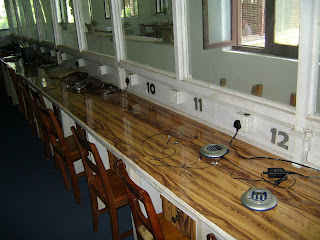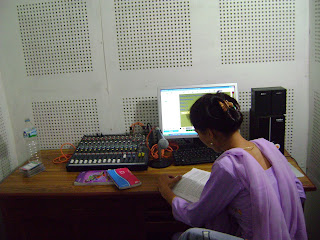Spent a month in the beautiful city of Pokhara in Nepal. Here on invitation from Inclusion Empowerment Center (IEC) Nepal, a organisation run by my friend Khom Raj Sharma. He was instrumental in creating the first audio library for blind in Nepal few years ago. Prithivi Narayan campus is a short ride from Lakeside Pokhara, sitting high above the white waters of the Seti river. It is walking distance from Seti River Gorge, a popular tourist destination.
I met up with Khom, Tek Thapa, Birajman Kumal, Laxman Subedi and Kumar Pun at the campus. Most of them are the former students and now work with various non-profit organisations, they are my tour guides for this morning. Walking around the campus, I learnt about the problems they faced as blind students, the lack of accessible teaching material was a biggest issue and the National Audio for Blind (NALB) was born. We interacted with some the blind students of the university on the way to the library.
We then entered the Regional library building and walked past the wooden librarians desk and beyond the rows of tables to the far right corner of the library. The audio library is housed inside a sound proof room with large glass windows looking out into the main library. The space is divided into a large main hall and three small rooms. On one side along the glass paneled wall is large table with work spaces for a dozen people. Instead of workstations, we have DAISY players with headphones and few tape and CD players. Around the room there are large cabinets with neatly stacked disks of reading material. There is a recording room with workstation running DAISY recording software suite, a editing room with CD-ROM, tape replication/copier machines and office space for administrative purposes. It is neat and orderly. Unlike other projects in developing countries this library is clearly well cared for and buzzing with activity.
The project was setup by Kaski Association of the Blind(KAB) with the aid of Force Foundation of Netherlands. The Tribhuvan University contributes money for running of library and students get access to library for a nominal annual fee. It is very heartening to see this initiative born out the need of print disabled. Perhaps other developing countries can learn from this project and build audio libraries of their own.












No comments:
Post a Comment
You can leave a comment here using your Google account, OpenID or as an anonymous user.